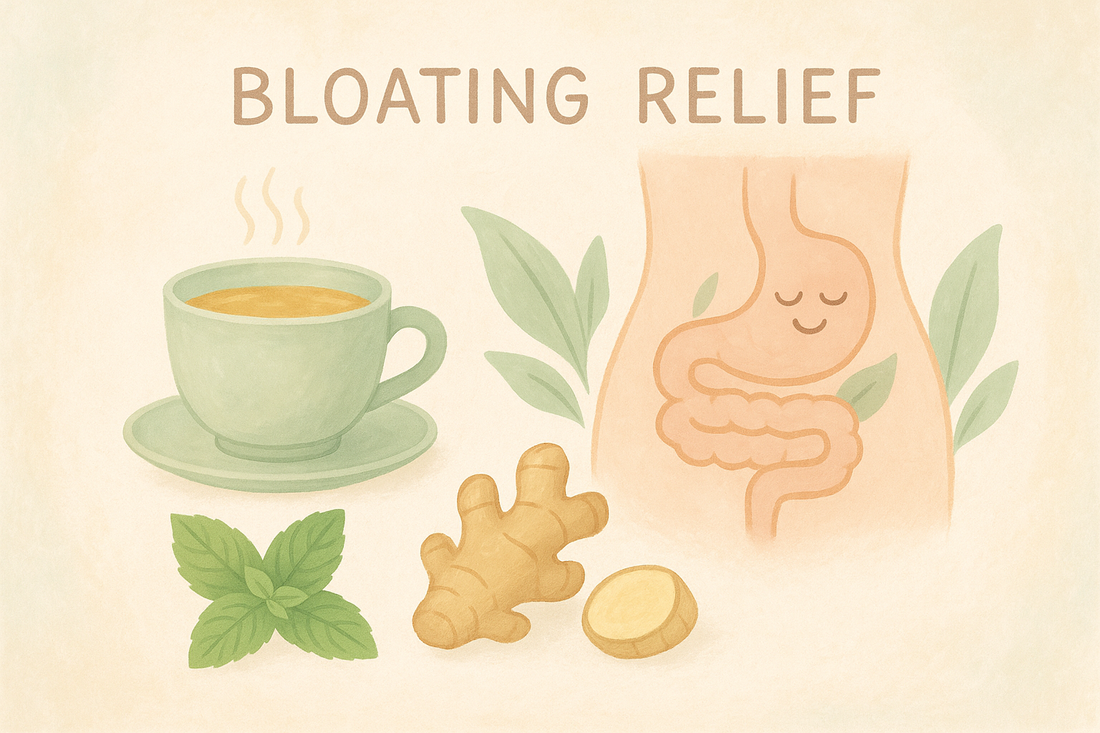
Best Teas for Bloating: Eastern Wisdom for Gut and Energy Flow
Share
When your stomach feels heavy, swollen, or uncomfortable, the issue often goes beyond food — it’s about flow. In Eastern medicine, bloating isn’t just about digestion; it’s about Qi, the vital energy that moves through your body. When this flow becomes stuck, we feel tension not only in the belly but in the mind.
That’s why tea, with its warmth and movement, has long been seen as the simplest way to restore balance.
What Causes Bloating in Eastern Philosophy
In Traditional Chinese Medicine (TCM), bloating — or Qi stagnation — is more than a digestive discomfort. It’s the body’s way of signaling that energy has stopped flowing as it should.
When this flow slows down, the body feels heavy, emotions become stuck, and even time seems to move differently.
Here’s how it happens:
- Emotional stress and overthinking — In TCM, excessive mental activity (Si) and emotional tension block the liver’s ability to move Qi freely. This leads to abdominal tightness, chest heaviness, and a feeling of internal pressure.
- Irregular sleep and late nights — Staying up past midnight weakens the liver and gallbladder meridians, disturbing their natural cycle of detox and renewal. This “misalignment” causes stagnation and digestive sensitivity.
- Hormonal fluctuations in women — During the menstrual cycle, Qi and blood shift direction within the body. Before menstruation, when liver Qi often becomes constrained, bloating, tenderness, and water retention are common.
- Cold or heavy foods — These slow down the digestive fire (Yang Qi) and create internal dampness — a feeling of fullness or “sogginess” that feels like trapped air.
- Lack of movement or breath — When we sit for long hours or breathe shallowly, the spleen and diaphragm lose rhythm, and energy stops circulating between the upper and lower body.
In short, bloating is not just about what you eat, but how your energy moves.
To heal it, you don’t simply “remove the gas” — you restore the movement of Qi, the invisible rhythm that harmonizes digestion, mood, and hormonal balance.

The Best Teas for Bloating Relief
Each tea carries its own kind of energy — warming, cooling, dispersing, or grounding.
Here are the teas most often used to restore comfort and flow:
| Tea | Region & Origin | Effect | Energy |
|---|---|---|---|
| Pu’er Tea (普洱茶) | Yunnan, China | Aged and fermented, it breaks down food stagnation, helps digest fats, and dispels “damp Qi.” | Deep, grounding, earthy |
| Ginger Tea | Asia | Warms the stomach, improves circulation, and relieves cold-induced bloating. | Warming, activating |
| Fennel Tea | Mediterranean & India | Eases intestinal cramps and gas, supports gentle detox. | Spicy, harmonizing |
| Peppermint Tea | Western herbal tradition | Relaxes the digestive tract and cools inflammation. | Cooling, refreshing |
| Chamomile Tea | Europe | Calms both the gut and the mind, reducing bloating caused by anxiety. | Soft, soothing |
| Oolong Tea | Southern China | A half-fermented tea that “cuts grease” and aids post-meal digestion. | Balanced, clearing |
Pu’er Tea: The Earth Element in Motion
Pu’er tea is particularly powerful for bloating.
In TCM theory, it belongs to the Earth element, which governs digestion and transformation. Its post-fermented nature gives it a mild warmth that “moves the Qi without burning it”, making it perfect for those who feel heavy after meals.
Each sip of Pu’er carries the wisdom of mountain mist and time. Its dark, mellow flavor anchors your energy, reminding you to slow down — to digest not only your food but also your day.
For those who love pairing rituals, Pu’er tea can be complemented with the Fortune Citrus Spray — its scent of sweet orange, patchouli, and western hemlock awakens the same feeling of gentle circulation, turning your space into an open channel for energy to flow.
The Mind–Body Connection: When Emotion Feels Like Bloating
In both East and West, we now understand that the gut is the “second brain.”
When emotions get stuck — anxiety, overthinking, self-judgment — they often manifest physically as tightness in the abdomen.
Tea becomes more than a digestive aid; it becomes a form of mindful release.
- Sip slowly, allowing warmth to travel through your center.
- Breathe with the steam, exhaling stagnant thoughts with each breath.
- Feel the shift — from pressure to flow, from tension to softness.
How to Create a Daily Tea Ritual for Gut Calm
- Morning: Start your day with a cup of Pu’er or ginger tea to warm your center and awaken digestion.
- Afternoon: Try peppermint or oolong after lunch to clear heaviness.
- Evening: End your day with chamomile or lemon balm for relaxation and release.
If you like to extend this ritual into your space, explore our Coffee Oil Guide or Patchouli Oil Benefits — both connect scent, breath, and the emotional digestion of life.
The best tea for bloating is not just the one that relieves your stomach — it’s the one that teaches your body to breathe again.
In every cup, warmth meets awareness, and the stagnant becomes alive.
Our Philosophy: Healing Through Nature
At Aurawell, we believe that true healing begins by returning to nature — to its quiet rhythm, scent, and balance.
Every herb, every drop of oil, and every breath of aroma carries a kind of wisdom that reconnects us with our inner stillness.
We create our products as gentle reminders that wellness is not a race toward perfection, but a return to harmony — between body and spirit, movement and rest, self and the natural world.
Through simple rituals — a cup of tea, a mindful breath, a grounding scent — we invite you to rediscover the power that already exists within you.
